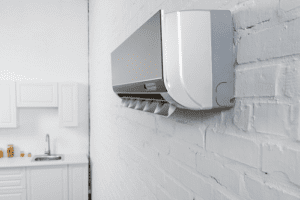When purchasing an HVAC system for your home or business, one of the primary considerations is energy efficiency. Furnaces, air conditioning units, ductwork: it can all combine to represent a pricey investment. It makes sense to plan for a system that will deliver more value (and lower costs) going forward, and putting together a truly efficiency system is the best way to do that. The question is, what goes into making an energy efficient HVAC system? In this post, we will dive into the six factors you should consider when trying to find the most energy-efficient HVAC equipment or working to make your existing system more efficient.
- Energy efficiency ratings
 The first and most obvious way to shoot for energy efficiency when purchasing new HVAC equipment is to look at the various ratings that are intended to measure efficiency. The two most commonly cited energy efficiency ratings for air conditioning systems are SEER (Seasonal Energy Efficiency Ratio) and EER (Energy Efficiency Ratio). EER measures an air conditioner’s efficiency under a very specific/laboratory-set array of conditions, while SEER takes seasonal fluctuations into account. You can learn more about which calculation you should be using for your purposes by reading our blog on the subject. In either case, though, the higher the rating, the more efficient the AC unit will be.
The first and most obvious way to shoot for energy efficiency when purchasing new HVAC equipment is to look at the various ratings that are intended to measure efficiency. The two most commonly cited energy efficiency ratings for air conditioning systems are SEER (Seasonal Energy Efficiency Ratio) and EER (Energy Efficiency Ratio). EER measures an air conditioner’s efficiency under a very specific/laboratory-set array of conditions, while SEER takes seasonal fluctuations into account. You can learn more about which calculation you should be using for your purposes by reading our blog on the subject. In either case, though, the higher the rating, the more efficient the AC unit will be.
For a traditional gas-powered furnace, you will look instead for the AFUE rating, or Annual Fuel Utilization Efficiency. The AFUE rating measures how much fuel a furnace will need to burn to heat your house or business. AFUE is presented as a percentage figure. An AFUE rating of 92, for instance, indicates that the furnace in question will direct 92 percent of the fuel it burns toward heating your building; the other 8 percent will be wasted. The Environmental Protection Agency (EPA) requires that all home or business gas furnaces meet at least an AFUE rating of 78. Mobile homes have a bit more leeway, with 75 standing as the minimum requirement. You can go significantly more efficient in this area, though: there are furnaces on the market with AFUE ratings up to 98.
- System Size
The size of your HVAC system will play directly into its overall performance and efficiency. A system that is too small will overwork itself trying to heat or cool the space. A system that is too big will switch on and off more frequently than it should as it tries to reconcile the size of the space with the thermostat temperature. Both issues lead to quicker wear and tear of system components, greater energy usage, and problems with temperature consistency.
- System maintenance
The quest for an efficient HVAC system doesn’t stop when you decide about what heating or cooling unit to purchase. On the contrary, it is an ongoing process that demands proper system care and upkeep. Annual inspections and maintenance of your furnace and air conditioning unit are recommended, typically either right before or right after their peak seasons of use (winter and summer, respectively). Proper upkeep will help you catch problems with your system before they escalate into breakdowns or serious performance inhibitors. It will also help you keep your HVAC system operate at peak efficiency, reducing your energy usage and cutting down on your utility bills.
- Duct cleaning
Always remember that HVAC maintenance isn’t just about the actual heating or cooling units, but also about ductwork. In most homes or businesses, warm or cool air is distributed throughout the house via a network of ducts. These ducts can accumulate a lot of dust, dirt, mold, pollen, cat or dog hair, and other debris over time. In turn, these contaminants can have a negative impact on air quality, airflow, and overall HVAC system efficiency. Having your ducts cleaned every 1-2 years can minimize these risks.
- Insulation
Not only does HVAC efficiency go beyond the heating and cooling units themselves, but it also transcends the entire system setup. Other elements of your home or business building design can impact the efficiency of your system. Insulation, for instance, is a huge factor. A well-insulated home will hold warm or cold air better, meaning less work for the HVAC system and better return-on-investment overall.
- Windows and glass doors
Going hand-in-hand with insulation are glass doors and windows. Even in a well-insulated building, windows can be a weak point where heat transfer occurs quickly—especially when it’s unusually hot or cold outside. This problem is most pronounced with older single-pane or poorly sealed windows. In modern homes, windows and glass doors are often double or triple-glazed, which substantially insulates the glass to offer superior thermal performance.
Consult with an HVAC Professional to Learn More about an Energy Efficient HVAC System
Perhaps you are shopping for a new HVAC system and are looking for advice, or maybe you are looking for ways to improve your home and make way for a more energy-efficient HVAC system. In either case, consulting with a professional HVAC contractor will make the process markedly easier. An HVAC consultant can explain efficiency ratings, help you size HVAC equipment to suit your home or business, and more.

